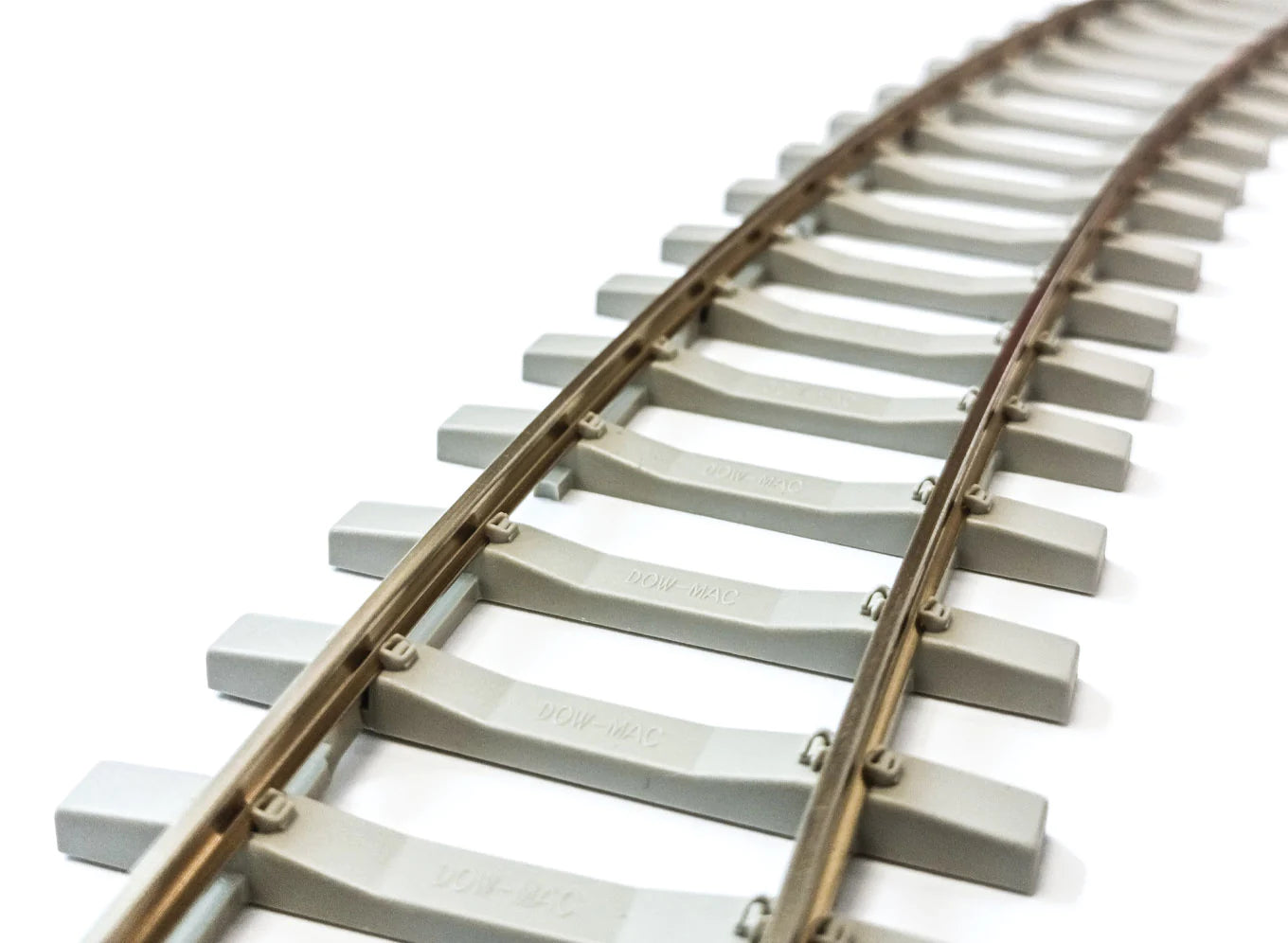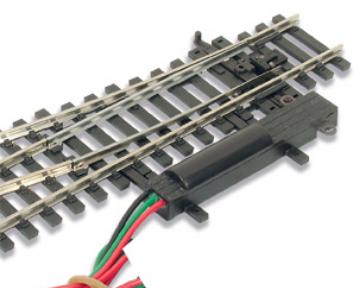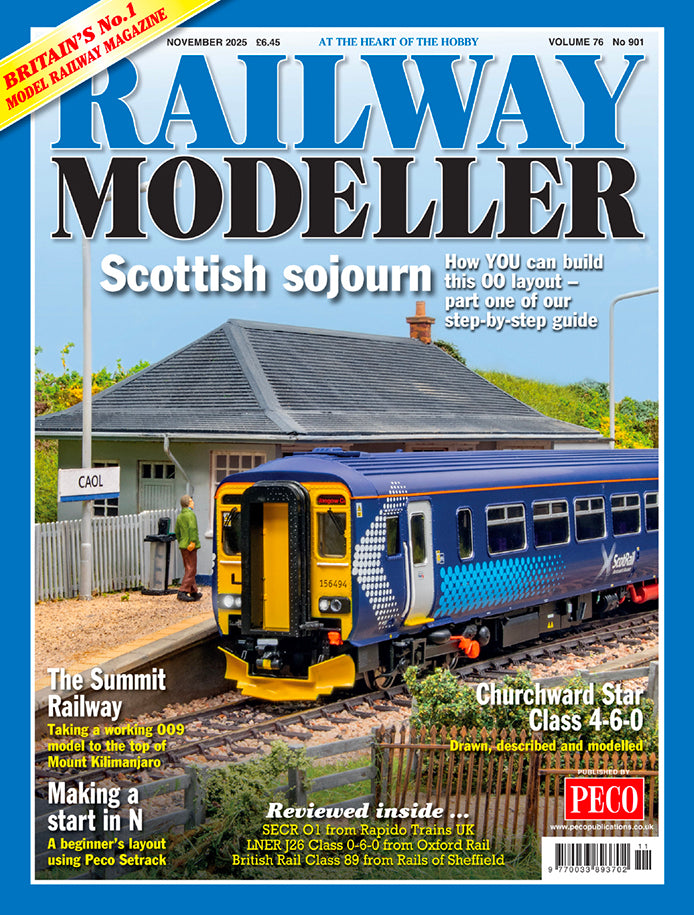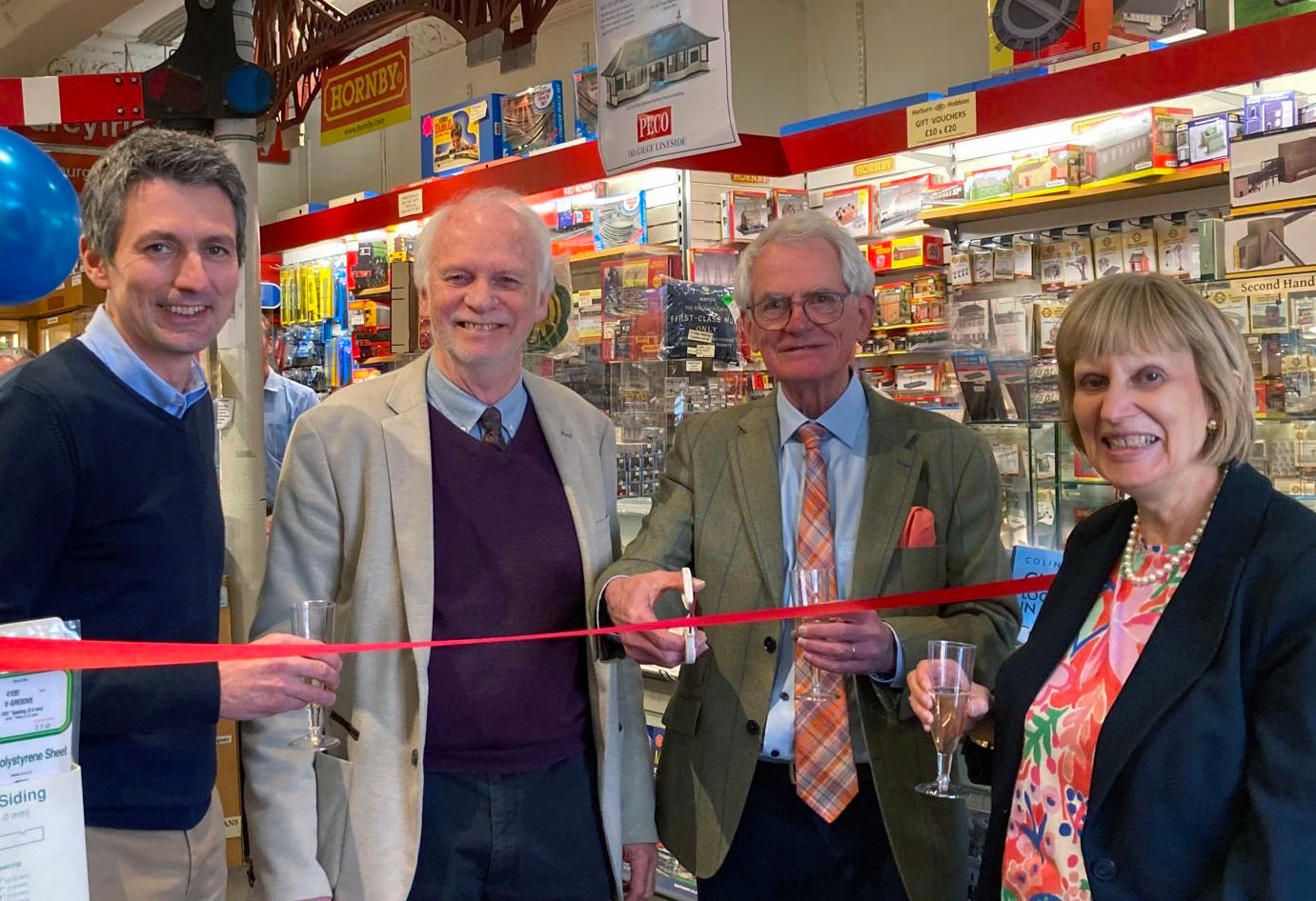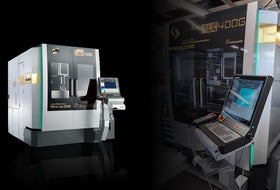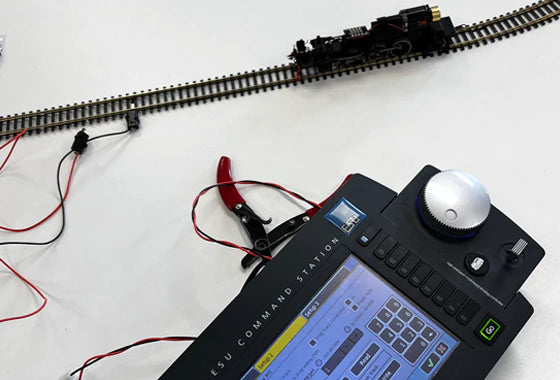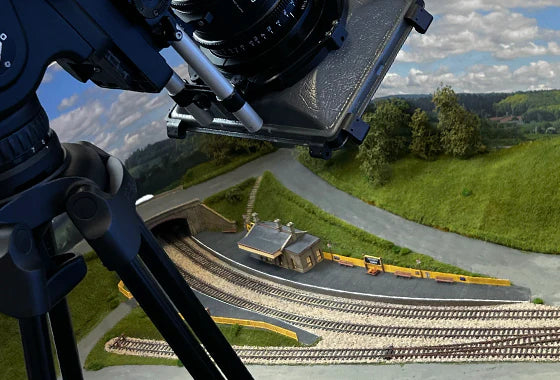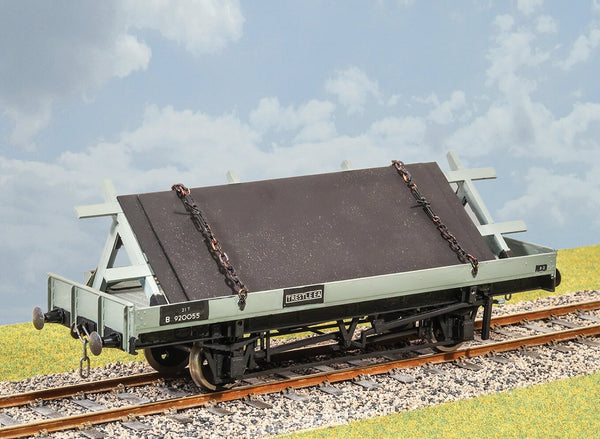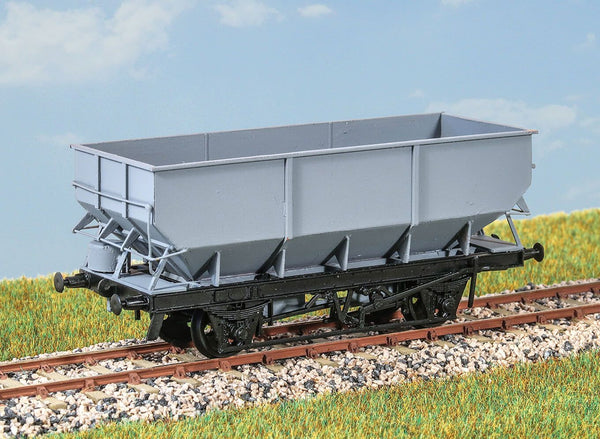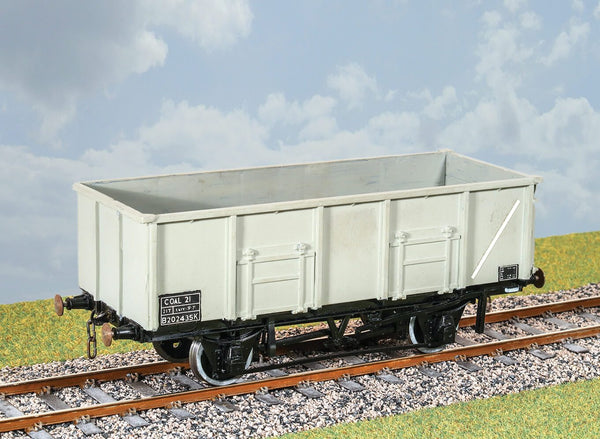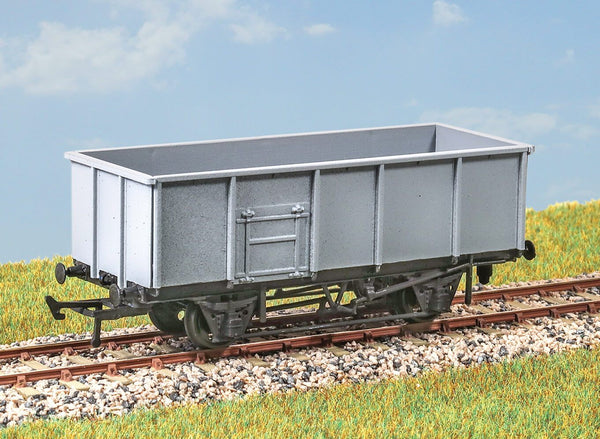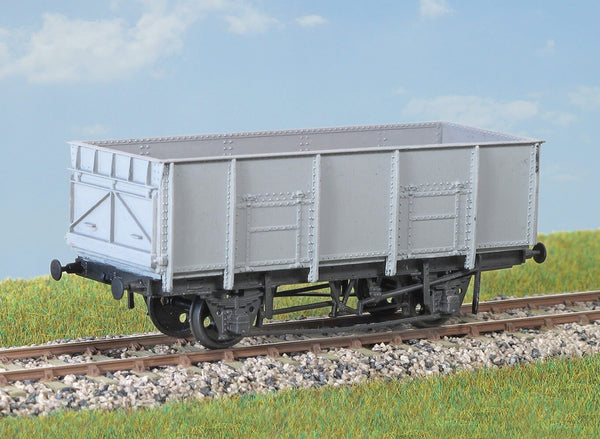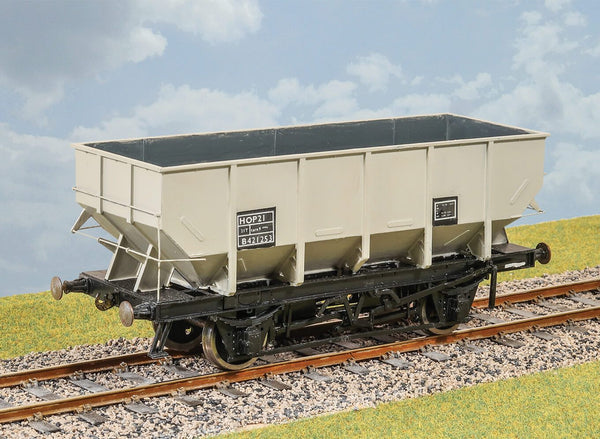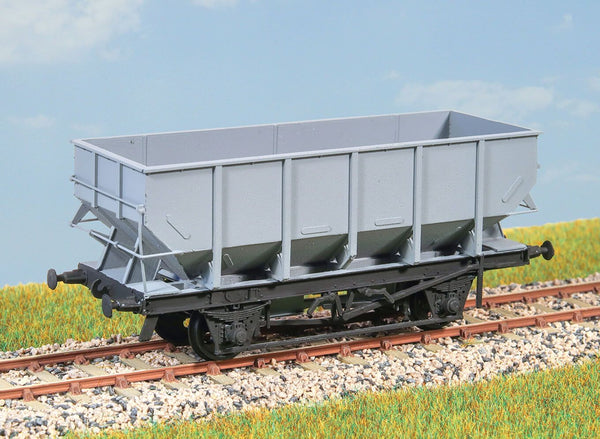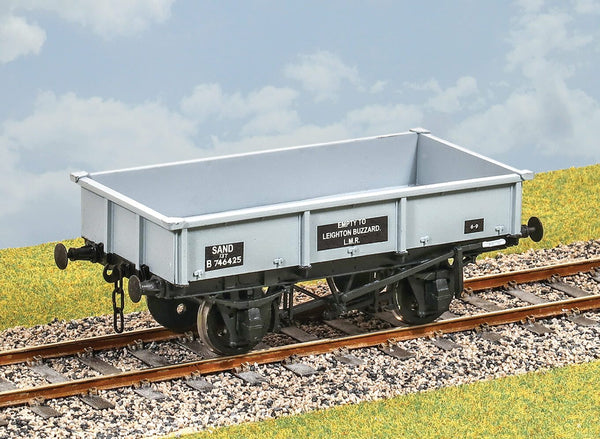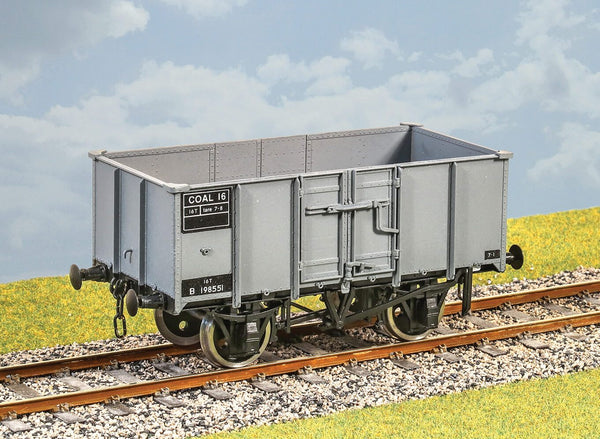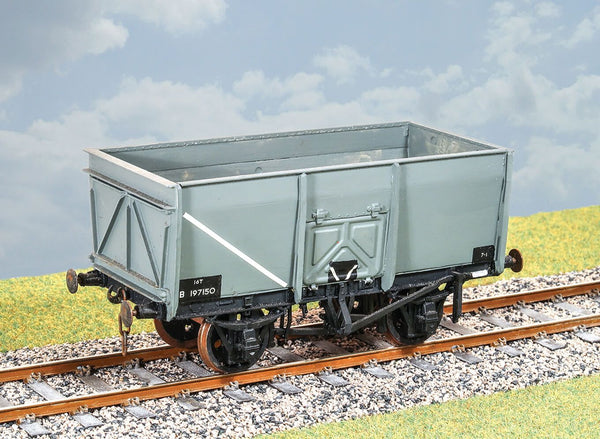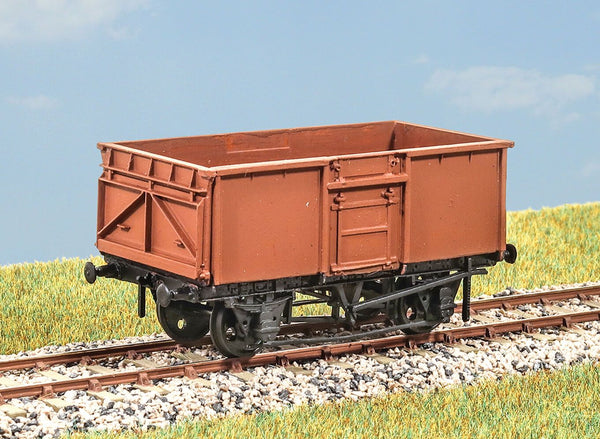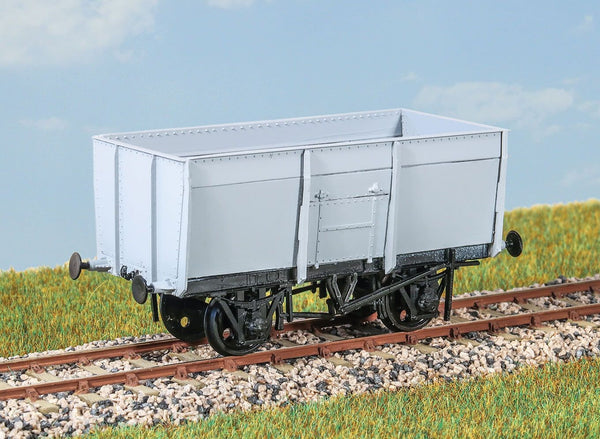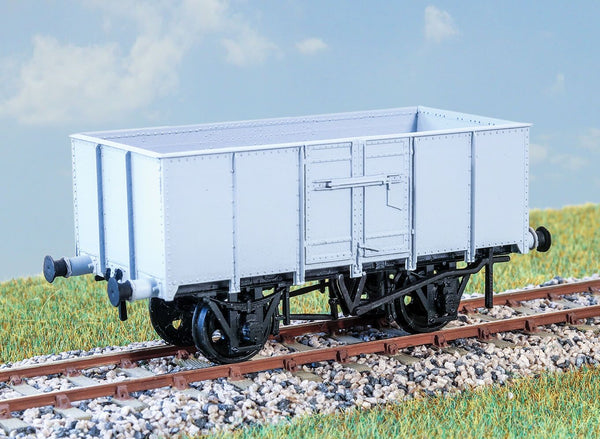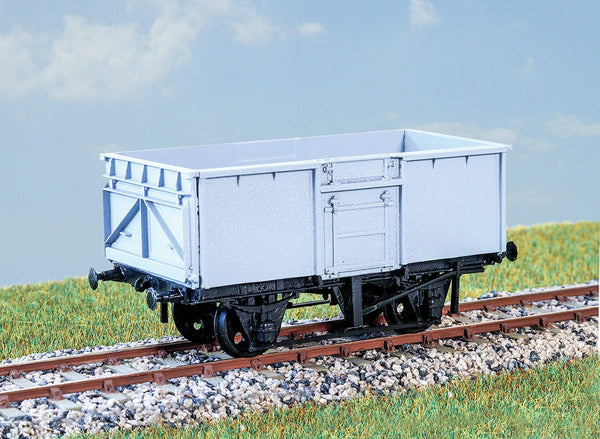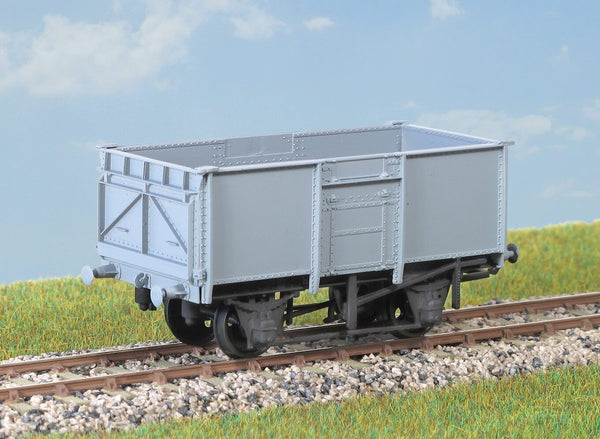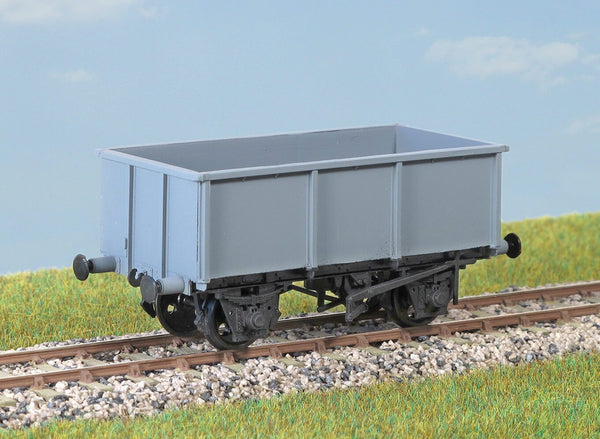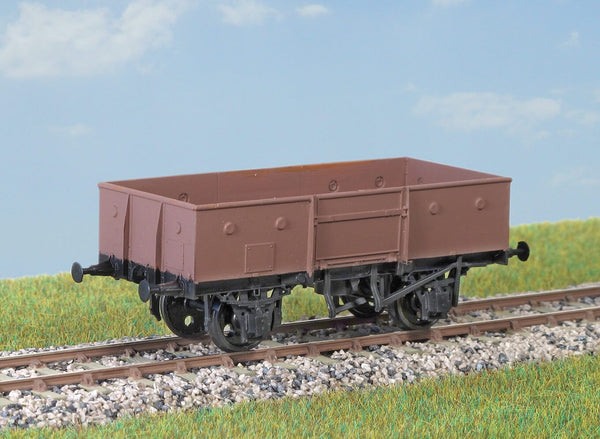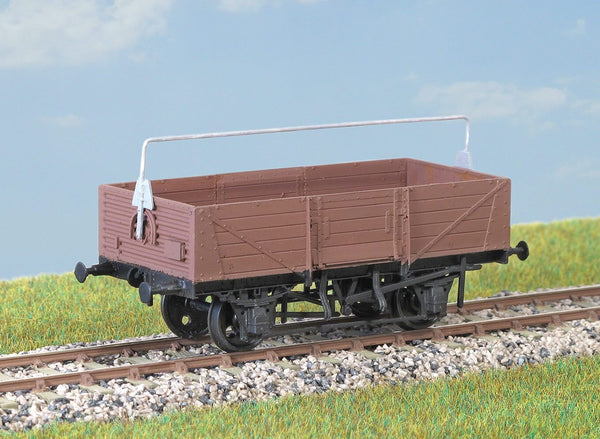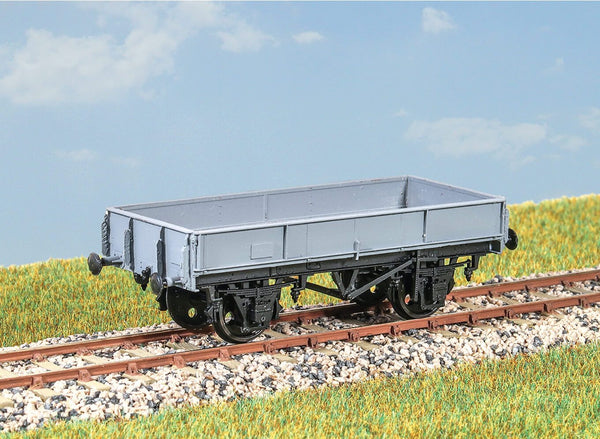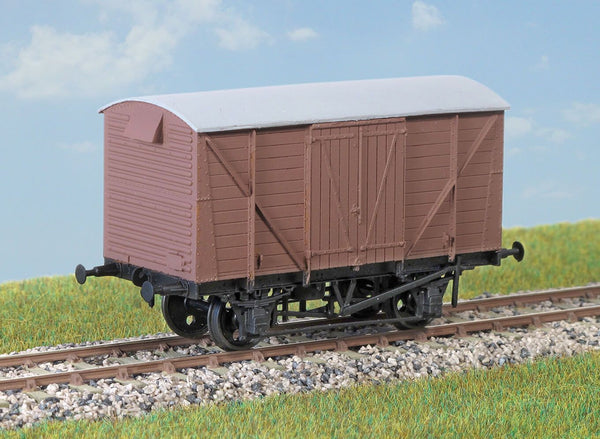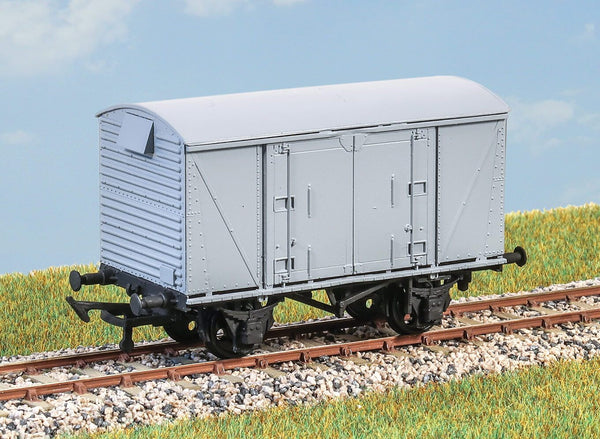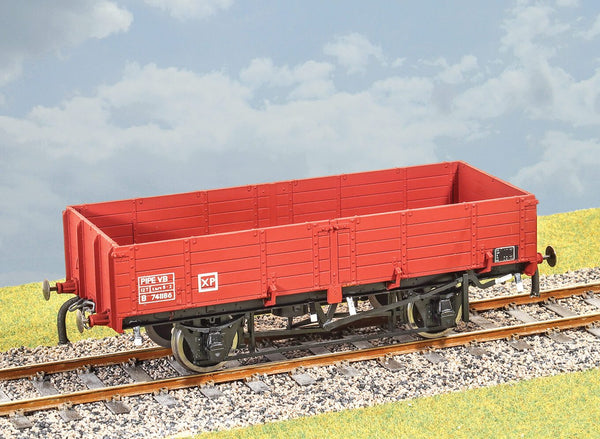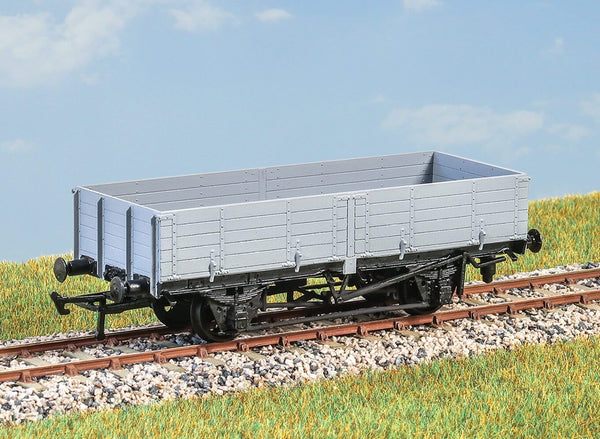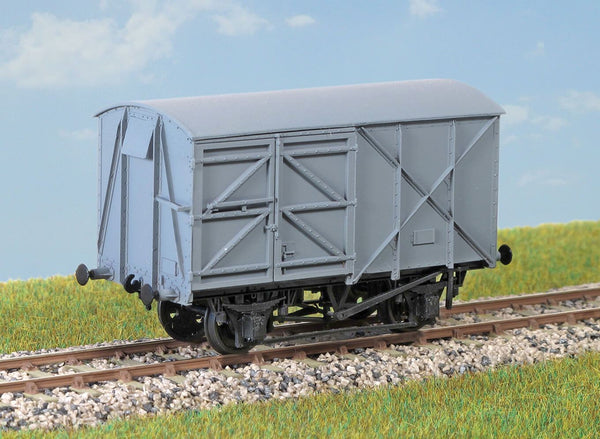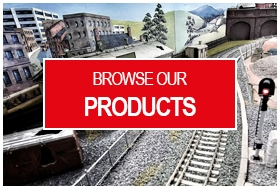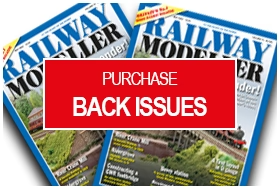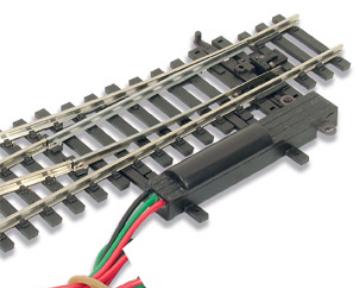BROWSE PECO PRODUCTS
Browse through our complete product portfolio.
241 Products Found
BR 21ton Trestle Wagon
This design of wagon allowed over-sized steel plates to be carried on a trestle mounted on the wagon. These wagons remained in service into the 1970s. Kit includes securing chains and shackles. Transfers for BR 1950s – 1970s. These finely moulded plastic wagon kits come complete with pin point axle wheels and bearings, 3 link couplings and transfers. This kit is supplied with pre-coloured moulded parts although painting can improve the appearance. Additional parts to enable the vehicle to be modelled incorporating modifications made to the prototypes during their working life are included where appropriate.
BR 21ton Rebodied Hopper Wagon
21 ton Rebodied Hopper Wagon (Vac. Braked) In the 1970s BR started to put new bodies on hopper wagons built in the 1940s and 1950s. Some ran with vacuum brakes. Examples lasted into the 1990s. These finely moulded plastic wagon kits come complete with pin point axle wheels and bearings. Glue and paint will be required, along with appropriate transfers . Additional parts to enable the vehicle to be modelled incorporating modifications made to the prototypes during their working life are included where appropriate.
BR 21ton Mineral Wagon
1,500 examples built 1950 – 1951, mainly for the transport of coal. Widely used and lasted until the 1980s. Transfers for early and post-TOPS BR. These finely moulded plastic wagon kits come complete with pin point axle wheels and bearings, 3 link couplings and transfers. This kit is supplied with pre-coloured moulded parts although painting can improve the appearance. Additional parts to enable the vehicle to be modelled incorporating modifications made to the prototypes during their working life are included where appropriate.
BR 21ton Mineral Wagon
(Rebuilt 1977) This vehicle represents the end of the evolution of the classic British coal wagon. Introduced in 1977, using spare chassis, 947 were built and used chiefly for industrial coal traffic.These finely moulded plastic wagon kits come complete with pin point axle wheels and bearings. Glue and paint will be required, along with appropriate transfers. Additional parts to enable the vehicle to be modelled incorporating modifications made to the prototypes during their working life are included where appropriate.
BR 21ton Coal Wagon
1000 of these wagons 21 ton Coal Wagon (diagram 1/110) were built in 1950/51 for BR by the Metro-Cammell company. Many were still in service in the late 1970s. These finely moulded plastic wagon kits come complete with pin point axle wheels and bearings. Glue and paint will be required, along with appropriate transfers. Additional parts to enable the vehicle to be modelled incorporating modifications made to the prototypes during their working life are included where appropriate.
BR 21ton Coal Hopper Wagon
16,800 of these wagons were constructed in the 1950s. They were widely used throughout the North East for the transport of coal. Roller bearing axle boxes were applied to some in the 1960s, options for which are in the kit, and lasted until the 1980s. Transfers for early, late and post-TOPS BR. These finely moulded plastic wagon kits come complete with pin point axle wheels and bearings, 3 link couplings and transfers. This kit is supplied with pre-coloured moulded parts although painting can improve the appearance. Additional parts to enable the vehicle to be modelled incorporating modifications made to the prototypes during their working life are included where appropriate.
BR 21ton Coal Hopper Wagon
Diagram 1/146. 16,800 were built between 1952 and 1958. They were widely used for coal traffic especially in North East England. Common well into the 1980s. The kit has a choice of roller and oil axleboxes. These finely moulded plastic wagon kits come complete with pin point axle wheels and bearings. Glue and paint will be required, along with appropriate transfers. Additional parts to enable the vehicle to be modelled incorporating modifications made to the prototypes during their working life are included where appropriate.
BR 18ton Sand Wagon
A fleet of specialist wagons for industrial and building sand were constructed in the early 1950s. They were designed for emptying by tipper or grab. Withdrawal started in the 1970s, some lasting in Civil Engineers service into the 1980s. Transfers for early and post-TOPS BR. These finely moulded plastic wagon kits come complete with pin point axle wheels and bearings, 3 link couplings and transfers. This kit is supplied with pre-coloured moulded parts although painting can improve the appearance. Additional parts to enable the vehicle to be modelled incorporating modifications made to the prototypes during their working life are included where appropriate.
BR 16ton Mineral Wagon
6,000 were built at the end of the Second World War for service in France. They returned to the UK later in the 1950s and remained in use into the 1960s. Many were then sold into private industry use. Transfers for BR. These finely moulded plastic wagon kits come complete with pin point axle wheels and bearings, 3 link couplings and transfers. This kit is supplied with pre-coloured moulded parts although painting can improve the appearance. Additional parts to enable the vehicle to be modelled incorporating modifications made to the prototypes during their working life are included where appropriate.
BR 16ton Mineral Wagon
The sloped sided design evolved from pre-1939 private owner wagons built by Chas. Roberts and Co. After the liberation of France 2,500 were shipped over there, 1,900 later returning. Around 10,000 were in stock with BR, with withdrawal taking place in the 1960s. Some ended up private industry use. Transfers for BR. These finely moulded plastic wagon kits come complete with pin point axle wheels and bearings, 3 link couplings and transfers. This kit is supplied with pre-coloured moulded parts although painting can improve the appearance. Additional parts to enable the vehicle to be modelled incorporating modifications made to the prototypes during their working life are included where appropriate.
BR 16ton Mineral Wagon
Vacuum fitted, introduced in 1956, these wagons continued to be used throughout the BR period, carrying coal to coal depots and factories as well as scrap (from 1975), aggregate and engineer’s spoil.
These finely moulded plastic wagon kits come complete with pin point axle wheels and bearings. Glue and paint will be required, along with appropriate transfers. Additional parts to enable the vehicle to be modelled incorporating modifications made to the prototypes during their working life are included where appropriate.
BR 16ton Mineral Wagon
About 8000 were built in 1944-1947, almost 2000 of which worked in France until repatriated in the early 1950s. Most survived until the mid 1960s, as BR diagram 1/100. These finely moulded plastic wagon kits come complete with pin point axle wheels and bearings. Glue and paint will be required, along with appropriate transfers. Additional parts to enable the vehicle to be modelled incorporating modifications made to the prototypes during their working life are included where appropriate.
BR 16ton Mineral Wagon
(French type) Introduced in 1946, 7000 of these wagons were supplied to France and returned to BR in 1950-1952, where they lasted until the mid 1960s. These finely moulded plastic wagon kits come complete with pin point axle wheels and bearings. Glue and paint will be required, along with appropriate transfers. Additional parts to enable the vehicle to be modelled incorporating modifications made to the prototypes during their working life are included where appropriate.
BR 16ton Mineral Wagon
16 ton Mineral Wagon, Non Vacuum Fitted (diagram 1/108) Over 206,000 of these all steel, welded body wagons equipped with hand brakes only were built in the 1950s. They lasted in large numbers until the late 1980s. These finely moulded plastic wagon kits come complete with pin point axle wheels and bearings. Glue and paint will be required, along with appropriate transfers. Additional parts to enable the vehicle to be modelled incorporating modifications made to the prototypes during their working life are included where appropriate.
BR 16ton Min Wagon Riveted Body
Over 21,000 of these wagons (diagram 109) were built in the 1950s. This kit caters for either pressed steel end doors or the more common fabricated type. These finely moulded plastic wagon kits come complete with pin point axle wheels and bearings. Glue and paint will be required, along with appropriate transfers. Additional parts to enable the vehicle to be modelled incorporating modifications made to the prototypes during their working life are included where appropriate.
BR 16ton Iron Ore Tippler Wagon
500 of these vans (diagram 1/185) were built in the mid 1930s to carry fruit traffic - comprising soft and hard fruit and flowers - to destinations throughout Britain. These finely moulded plastic wagon kits come complete with pin point axle wheels and bearings. Glue and paint will be required, along with appropriate transfers. Additional parts to enable the vehicle to be modelled incorporating modifications made to the prototypes during their working life are included where appropriate.
BR 13ton Steel Open Goods Wagon
6500 of these wagons (diagram 1/037, 1/041) were built in the early 1950s, using a post war LNER design. Many survived into the 1980s. These finely moulded plastic wagon kits come complete with pin point axle wheels and bearings. Glue and paint will be required, along with appropriate transfers. Additional parts to enable the vehicle to be modelled incorporating modifications made to the prototypes during their working life are included where appropriate.
BR 13ton Open Goods Wagon
Over 8000 of these wagons (diagram 1/039, 1/044) were built to an LMS design in the 1950s. Used until the 1980s, some lasted another decade in the Civil Engineer’s fleet. These finely moulded plastic wagon kits come complete with pin point axle wheels and bearings. Glue and paint will be required, along with appropriate transfers. Additional parts to enable the vehicle to be modelled incorporating modifications made to the prototypes during their working life are included where appropriate.
BR 13ton Medium Goods Wagon
(Diagram 1/019) 4000 were built in 1950-55 to carry such loads as farm machinery and containers. In the 60s they had a second lease of life as Civil Engineers’ ballast wagons. Withdrawn in 1970s/80s.
These finely moulded plastic wagon kits come complete with pin point axle wheels and bearings. Glue and paint will be required, along with appropriate transfers. Additional parts to enable the vehicle to be modelled incorporating modifications made to the prototypes during their working life are included where appropriate.
BR 12ton Van Plank Sides
Over 19,000 of these standard vans (diagram 1/208) were built in the 1950s for general goods traffic and lasted into the 1980s. Alternative plywood doors are included. These finely moulded plastic wagon kits come complete with pin point axle wheels and bearings. Glue and paint will be required, along with appropriate transfers . Additional parts to enable the vehicle to be modelled incorporating modifications made to the prototypes during their working life are included where appropriate.
BR 12ton Van
In 1962, 1994 of these vans (diagram 1/217) were built. They have extra wide doors to allow fork lift trucks to handle loading. Some were converted to air brake operation. These finely moulded plastic wagon kits come complete with pin point axle wheels and bearings. Glue and paint will be required, along with appropriate transfers. Additional parts to enable the vehicle to be modelled incorporating modifications made to the prototypes during their working life are included where appropriate.
BR 12ton Pipe Wagon
These wagons were designed to carry heavy cast iron or steel pipes for water and drainage works. This kit represents one of 350 built in 1955. Withdrawn between late 70s and early 80s. Transfers for early and post-TOPS BR. These finely moulded plastic wagon kits come complete with pin point axle wheels and bearings, 3 link couplings and transfers. This kit is supplied with pre-coloured moulded parts although painting can improve the appearance. Additional parts to enable the vehicle to be modelled incorporating modifications made to the prototypes during their working life are included where appropriate.
BR 12ton Pipe Wagon
Introduced in 1949 to an LMS design, 800 of these wagons (diagram 1/460) carried large diameter pipes for the construction industry. Withdrawn in the early 1980s. These finely moulded plastic wagon kits come complete with pin point axle wheels and bearings. Glue and paint will be required, along with appropriate transfers. Additional parts to enable the vehicle to be modelled incorporating modifications made to the prototypes during their working life are included where appropriate.
BR 12ton Pallet Van
Construction of these vans (diagram 1/211) started in 1952. Their wide doors were designed for loading by fork lift truck. They were withdrawn in the mid 1960s. These finely moulded plastic wagon kits come complete with pin point axle wheels and bearings. Glue and paint will be required, along with appropriate transfers. Additional parts to enable the vehicle to be modelled incorporating modifications made to the prototypes during their working life are included where appropriate.
